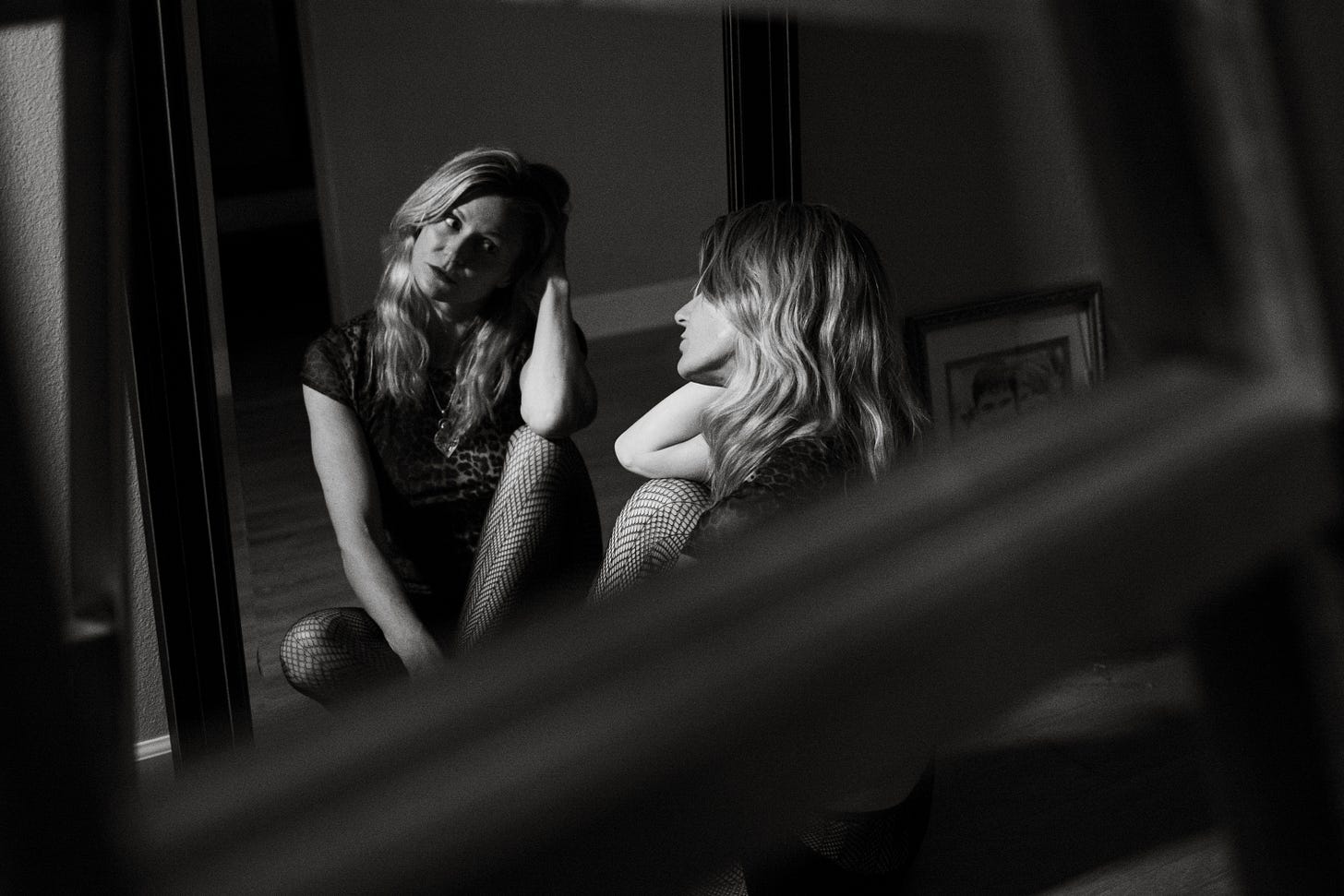It always starts small. A look. A tone. A sentence spoken without the softness you needed it to land with. This time, it started because I felt dismissed while asking for help cleaning the kitchen. I didn’t even realize it until my voice sharpened, until my heart started pounding, until I could feel my entire nervous system bracing for something my husband wasn’t even trying to throw at me. But my body couldn’t tell the difference. It never can.
What I always want in those moments - what I have begged for with trembling hands and too many words - isn’t perfection. It’s curiosity. I want the person who says they love me to pause long enough to ask what hurt. Not just what I’m reacting to, but what I’m reacting from. I want to be met with presence, not punishment. With the kind of sacred witnessing that doesn’t rush to fix or defend or debate. I want someone to sit in the mess with me and say: I see you spiraling. I want to understand why.
And I want to offer that too… to the people I love, the people I fight with, the people I can’t always see clearly through my own fear. I want to meet my husband’s anger with softness, when I can. I want to be the one who says: “Hey, I see you’re hurting. What’s underneath this? And how can I help lower the heat?” But the truth is, that kind of curiosity takes work. It takes practice and unlearning. And in a world that runs on reactivity, where every algorithm rewards outrage and every headline is a weapon, it takes a kind of radical clarity to choose connection over collapse.
I was still thinking about all of this - the inner weather systems of a marriage, the tender negotiations required just to stay human with the people we love - when I saw it happening in real time between two of my family members. Not in person, but in the comment section of a Facebook post.
One relative had posted photos from the No Kings Day protest. The caption was raw, scorched-earth, and not wrong: “If you voted for Trump, fuck you. You’re out of my life.” The grief in it was palpable. The desperation and rage that so many of us are feeling right now. The clear line drawn in the sand when the world feels like it’s burning and you don’t know who still sees the fire.
Another family member responded, just a few lines below, with a crying emoji and the comment: “Wow. You’d really let politics end our relationship? That’s so sad.”
And that might’ve been their final exchange. Sixty years of shared blood and birthdays and secrets and casseroles… done. Over a status update.
But it wasn’t the profanity that ended them. It wasn’t even the politics. It was the absence of curiosity. It was the refusal to ask: what pain is living under that rage? What truth is trying to claw its way out of that severance? What fear made this person believe that losing me was safer than trying to be understood by me?
Because maybe, if that comment had said something different, if it had sounded like: “Wow. I can feel how much this matters to you. I’m curious what you're seeing that I’m not…” - maybe the door wouldn’t have closed so permanently. Maybe, instead of framing the disagreement as sad, there could’ve been a moment of reckoning. Of asking why. Not to fix. Not to win. But to stay in it long enough to remember what the relationship once meant.
But we don’t live in a culture that values that kind of inquiry anymore. We don’t make space for emotional truth, especially when that truth doesn’t come dressed in the right tone. Especially when it’s angry or when it indicts the systems we were taught to defend.
I keep coming back to this: I’m raising daughters in a country where curiosity is treated like a threat. Where tenderness is met with mockery. Where if you dare to care about human rights or the Constitution or the psychological toll of living through slow-moving collapse, you are written off as hysterical, extremist, or worse… unpatriotic.
And I know what it is to be erased. To have your service discounted because your grief doesn’t toe the party line. I’ve worn the uniform, sworn the oath, deployed in defense of a country that now feels foreign. And the same people who praised me for being strong, for being GI Jane, for being one of the “good ones,” would turn on me the second I say: this isn’t freedom. This isn’t justice. This isn’t safety. This is collapse being dressed up as pride.
And still, despite all of it, I want even those who would hurt me to be protected by rights. I want them to be given due process. I want them to have access to truth. Because I know what it is to have your mind warped by fear and propaganda. I know what it is to lash out when what you really need is to be seen. And I know there’s still a version of them, somewhere deep down, that could wake up, if only someone met them with curiosity instead of contempt.
This goes for all of us. This goes for both sides.
When someone says, “Something in me is hurting. Something in me is afraid. Something in me is lashing out and I don’t know how to stop,” what would happen if we didn’t call them the problem, but instead held up a mirror to the environment that made them this way? What if we stopped blaming the wound and started questioning the knife?
Because what’s happening in our families is a microcosm of what’s happening in our country. We are losing each other to the noise. We are letting the comments section become the final chapter. And we are forgetting that curiosity isn’t weakness… it’s the last thing holding us together.
And when we’re left alone, wondering where our loved ones went, we may be asking ourselves, “how the fuck did we get here?”
But we’ll know, it’s because we never asked the questions we should have.
How the Fuck Are We Still Protesting Kings 250 Years Later?
The first protest I ever went to was No Kings Day on June 14, 2025.
About the Author
I’m Alisa Sieber; a writer, veteran, and relentless question-asker, exposing the patterns of power, control, and resistance that shape our world. My work blends personal reckoning with systemic critique, challenging the narratives we’ve been told and demanding we ask harder questions.
Share How the Fuck Did We Get Here?
How the Fuck Did We Get Here? is a deep dive into the systems failing us, the leaders gaslighting us, and the patterns of control we can’t afford to ignore. If this article resonated with you, share it with someone who needs to see the bigger picture.
Subscribe to How the Fuck Did We Get Here?
A new How the Fuck Did We Get Here? publishes as the events occur. Subscribe to stay informed, stay questioning, and never look away.
Also Read: How the Fuck Did I Get Here?
If you’re interested in personal storytelling, breaking generational cycles, and reckoning with trauma, identity, and resilience, check out my other series, How the Fuck Did I Get Here?
This series explores the deeply personal side of survival and transformation; where I ask not just how the world got here, but how I did.
👉 Read How the Fuck Did I Get Here?
🔗 Connect with Me
📲 Instagram: @alisa.sieber
🌍 Bluesky: @alisasieber.bsky.social
💬 Leave a comment below. I’d love to hear your thoughts.












Share this post